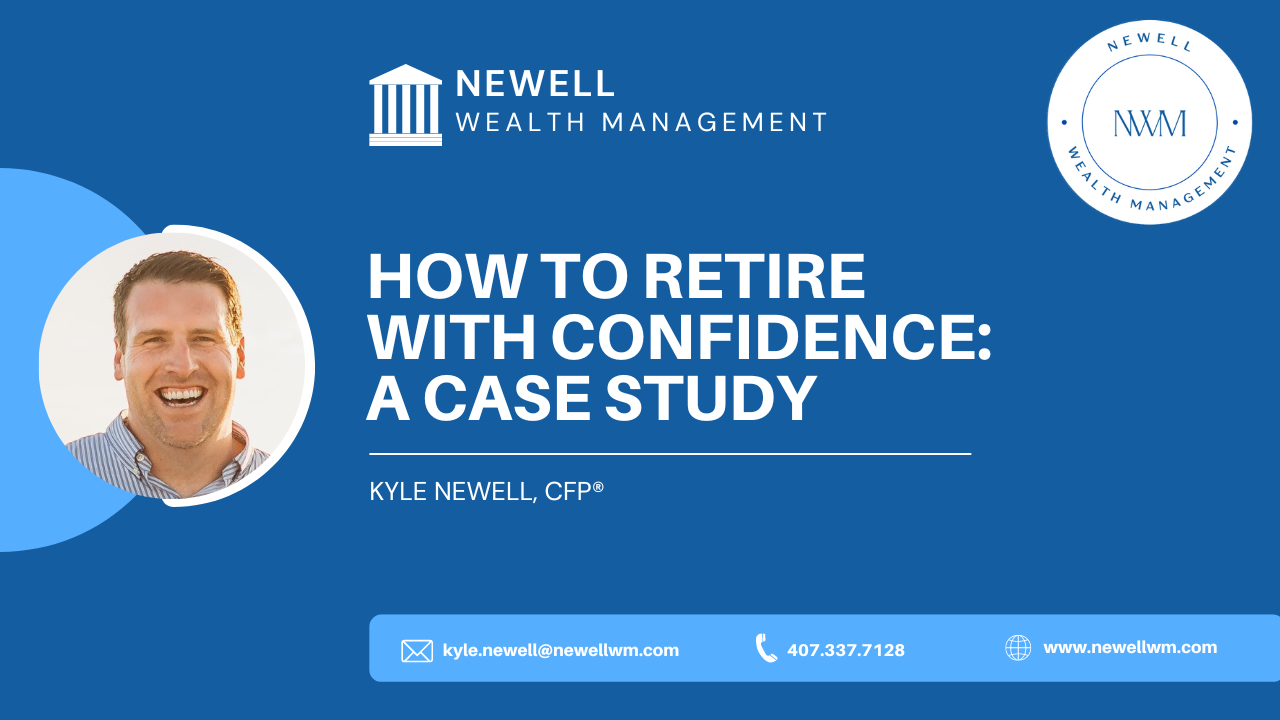How to Retire with Confidence: A Financial Case Study

Today we will look at a financial case study that offers proof of financial planning’s importance and why it should be a priority. You will also find five key steps to consider for your financial and retirement planning.
This study involves a busy leader from Disney who is in his mid-50s and married with two children. He’s at the peak of his earning years but heading toward retirement. He still has time for more growth in the company but is also in the busiest time of his life. High school-aged kids involved in extracurricular activities, demanding work responsibilities, and other commitments take up much of his mental capacity.
At the end of the workday, he wants to get a good night’s sleep. On his days off, he’d rather spend time with his family, doing something fun, or simply relaxing. Looking at numbers is not on his list of top ten ways to spend time off.
It can be challenging to manage finances with busy family and work lives. However, both this man and you know it’s crucial to nail down and secure your financial situation. Here are five things to think about to help you develop a solid financial plan, even amid chaos.

Establish Clear Financial Objectives and Goals
Every good financial planning strategy starts with knowing some key things.
- What you want to accomplish
- When you want to accomplish it by
- What’s the priority level you want to associate with your goal
Your goals may change over time. You can and should review your goals regularly to assess and readjust if necessary. Still, having a baseline to operate from is vital in your financial planning. Know what you want to achieve and set clear objectives for the next five, ten, or thirty years to get you there.
This step is going to be different for every person. A strategy to retire at 60 looks very different than one for 70. You could stop at age 60 and do consulting work for the next five years, for example.
In the case of our Disney leader, he is considering stopping at 55. He can then get a less mentally demanding job until age 65. His bills will be paid, but it will be less stressful than the leadership position he’s currently in.
There are lots of good strategies available. Each will have several variations. The baseline for all of them is knowing where you want to end up.
Consider Your Compensation and Taxation
In peak earning years, you may have Disney LTI or RSUs, bonus income, and, by now, a pretty healthy salary. You may also have other tax implications to think about. For example, if you are saving your bonus or getting Disney stock as your bonus, all of those are after-tax investments.
Disney withholds taxes on your salary and bonus income, but you don’t always want to be in a situation where you always get a ton of money back. Taxes on bonuses are a set rate, but salary withholding is something you can play with. Ensure you’re being tax-smart in your financial planning by considering the tax ramifications of making changes to those.
We can look at adjusting things like:
- Your salary withholding
- Tweaking up your 401k contribution
- Using Roth contributions instead of traditional ones
It involves looking at your taxes today, your next objective, and whether you need to realize taxes now or later. The goal is to nail down your current taxes and how to minimize them, not only for now but also for the future.
Review Your Investment Strategy
In this phase of life, you’ve taken risks, climbed the ladder, and are in a good spot income-wise. It’s only natural to think about potentially changing your investment approach.
You’ve probably built up a pretty good nest egg by now. It’s not as much about growing it as it is protecting it. You want growth prospects but not take as much risk as before.
Our Disney leader has his company 401k but is also considering options for his excess income, such as:
- Non-qualified investable accounts
- Annuities
- Life insurance
- Real estate
- Other businesses
There are many different options he can consider. Each will carry its own risk-return profile and tax implications.
Before making decisions for your financial strategy, answer these fundamental questions.
- How much risk do you want to take?
- How much risk are you comfortable taking?
- How much risk must you take to reach your goals and objectives?
Talk with your financial planner. They can advise you and help determine if your investment strategy needs to change and what the best mix might be.
Ensure You Have the Appropriate Insurance Coverage
Disney provides insurance for the gentleman in our case study. However, once in your 50s, the cost-benefit of a group insurance plan may not be in his favor. He may be better off looking at insurance outside the group since he’s relatively healthy.
Of course, everyone’s health is different. If you’re healthier, you may have better options outside the company. Group insurance may be the best choice if you have specific health issues.
Like this Disney leader, your income may also be higher. Group insurance may not offer the amount you need to cover if something happens, such as becoming disabled or passing away. Scenarios like these significantly impact financial plans, especially five to ten years before retirement.
In our case study, this Disney leader doesn’t want to leave his spouse and two children hanging and have to rely on assets that were meant to be used for future expenses. It seems small, but a five or ten-year difference can make a huge impact, especially now that his portfolio has gotten to the size where the earnings from that five or ten years could be more than the old earnings he’s saved up to this point.
It’s never easy to think about things like passing away or having a health crisis. Still, you need to be cognizant of protecting the “what ifs” of life and your family’s future.
Have the Right Documents in Place
This goes in tandem with having enough insurance. Our case study participant has two children who are getting closer to being 18. It feels harsh, but he must consider whether they can be responsible adults if something happens. He and his wife are talking about things like:
- Will they be able to take on that amount of wealth responsibly?
- Is it a burden they want to place on them?
- Should they have some estate planning to protect the kids from themselves until they reach an age or time that feels more comfortable with the children’s ability to handle the resources they are receiving responsibly?
Aside from the children, there is also the question of charitable support. What kind of legacy does he want to leave with his giving? If it’s important to you, then include it in your discussions.
All of this comes together in your estate planning documents. Many fail to think about what happens if you become incapacitated. Outlining your wishes in a legal document is essential to financial planning.
Who will make decisions on your behalf? Your kids may need more time to be ready. Your parents may be too old. You may have a sibling. What if none of those are viable options?
You want to think through who will take on the responsibilities for managing your will if you can’t do so or pass away. Sometimes attorneys or corporations will assume the role. It’s uncomfortable to think about, but it’s good to know that you have the proper documents in place. Not having them can be a nightmare for your family, on top of caretaking or grief.
Case Study Results
Considering these financial planning areas has allowed this 50-something Disney leader to make a comprehensive financial plan he feels good about. He continues to work and earn income. His investments have been adjusted to align with his objectives.
He sleeps well and relaxes, knowing his family has the appropriate insurance and documents to cover unexpected occurrences. They’ve talked as a family about aging and who will handle what if he passes away.
Time is precious and short. Don’t let the busyness of life stop you from making the plans you need to ensure you’re in a good financial place to successfully transition into retirement when you’re ready. Do it on your terms rather than being caught on your heels and making some decisions very quickly that might not work out.
If you need an experienced financial planner to guide you through any or all of these planning topics, I’m happy to help.
Important Information
Newell Wealth Management, LLC (“NWM”) is a registered investment advisor offering advisory services in the State of FL and in other jurisdictions where exempted. Registration does not imply a certain level of skill or training. The presence of this website on the Internet shall not be directly or indirectly interpreted as a solicitation of investment advisory services to persons of another jurisdiction unless otherwise permitted by statute. Follow-up or individualized responses to consumers in a particular state by NWM in the rendering of personalized investment advice for compensation shall not be made without our first complying with jurisdiction requirements or pursuant an applicable state exemption.
All written content on this site is for information purposes only and is not intended to provide specific advice or recommendations for any individual. Opinions expressed herein are solely those of NWM, unless otherwise specifically cited. Kyle Newell and NWM are neither an attorney nor an accountant, and no portion of this website content should be interpreted as legal, accounting or tax advice. Material presented is believed to be from reliable sources and no representations are made by our firm as to other parties’ informational accuracy or completeness. There is no assurance that the views or strategies discussed are suitable for all investors or will yield positive outcomes. Investment involves risks including possible loss of principal and unless otherwise stated, are not guaranteed. Any economic forecasts set forth may not develop as predicted and are subject to change. All information or ideas provided should be discussed in detail with an advisor, accountant or legal counsel prior to implementation.
